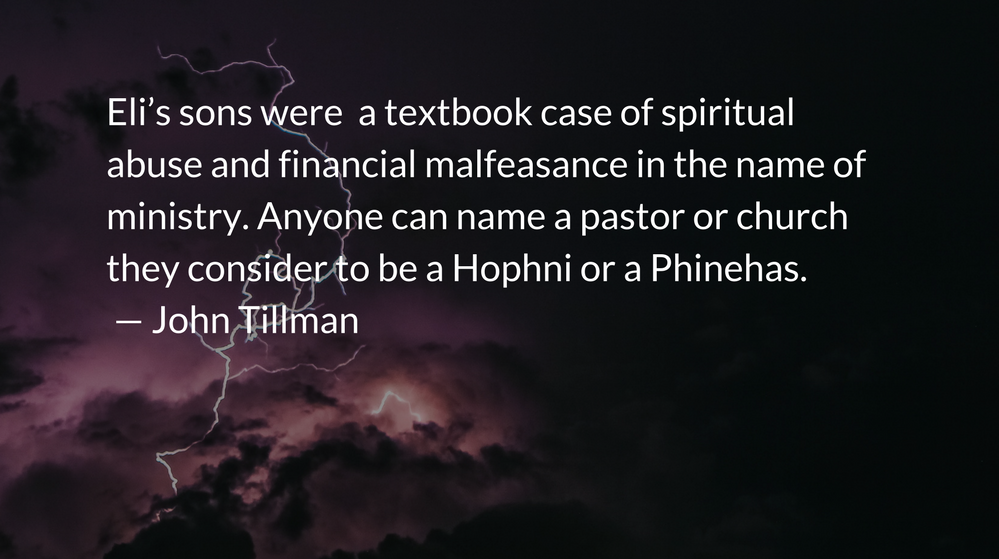Links for today’s readings:
Read: 1 Samuel 2 Listen: (6:09) Read: Hebrews 13 Listen: (3:31)
Scripture Focus: 1 Samuel 2.1-2
1 Then Hannah prayed and said:
“My heart rejoices in the Lord;
in the Lord my horn is lifted high.
My mouth boasts over my enemies,
for I delight in your deliverance.
2 “There is no one holy like the Lord;
there is no one besides you;
there is no Rock like our God.
Luke 1.46-49
46 And Mary said:
“My soul glorifies the Lord
47 and my spirit rejoices in God my Savior,
48 for he has been mindful
of the humble state of his servant.
From now on all generations will call me blessed,
49 for the Mighty One has done great things for me—
holy is his name.
Reflection: Were They Wrong?
By John Tillman
Hannah and Mary’s poems share themes. The hungry are fed. (1 Samuel 2.5; Luke 1.53) The poor are elevated. (1 Samuel 2.8; Luke 1.52-54) Wicked rulers are thrown down. (1 Samuel 2.9; Luke 1.51-52)
Hannah celebrated God fulfilling promises to her, including additional children to follow Samuel.
Mary celebrated confirmation from Elizabeth that God would fulfill promises to her and about Jesus.
Hannah and Mary understood better than most the need for salvation.
Those never experiencing darkness are less thankful for light. Those never having empty stomachs are less thankful when filled. Those never having parched throats are less thankful for drink. Those never wearing patched, damaged, or dirty clothes because they had no others, are less thankful for a closet full of choices. (Luke 7.40-48)
The salvation these prophetic women pictured was not metaphysical, formless, esoteric salvation from invisible things. There were tangible dangers, struggles, losses, and injustices they and their communities experienced. They expected and celebrated salvation in tangible terms.
Were they wrong?
Samuel, much less Hannah, would not live long enough to see Israel “inherit a throne of honor” (v. 8) or God “give strength to his king,” (v. 10) under David’s rule. Jesus, son of David, explicitly refused to bring down Herod or Caesar from their thrones and was executed under their authority. (John 18.36-37; Acts 1.6-8)
Did God fail to fulfill his promises in the way that these prophetic women understood them? Were they “tricked” into anticipating tangible salvation when God only meant “spiritual” salvation?
In short, no. But there is a fuller answer. First, both spiritual and tangible promises come true in time. But perhaps not the timing we or these women expect or prefer. Second, spiritual victories always precede tangible victories. Christ conquers and frees hearts before touching the world. But he will touch it. Third, God’s kingdom is both instantaneously available and incrementally inevitable. The victories prophesied are already true and not yet fully realized.
There is reason to believe that Hannah and Mary understood this ambiguity in their poems. They trusted in faith that spiritual and tangible kingdoms would one day unite and they celebrated every incremental step toward more just and righteous hearts that would work toward a more just and righteous world.
Human effort will not bring about God’s kingdom on Earth, no matter how hard we work. Jesus will bring it. However, let us celebrate the inevitable and imminent victory that is coming in ways small and slow or seismic and sudden.
How long, oh Lord? Come Lord Jesus!
Divine Hours Prayer: The Request for Presence
Hear, O Shepherd of Israel, leading Joseph like a flock; shine forth, you that are enthroned upon the cherubim. — Psalm 80.1
– Divine Hours prayers from The Divine Hours: Prayers for Summer
by Phyllis Tickle
Read more: Organizing Against Corruption
Any organization is vulnerable to corruption, even ones instituted by God. Priests, prophets, kings—none of them are invulnerable.
Read more: Offal Leaders
Malachi describes a de-commissioning…feces from the animal would be smeared on their faces, representing impurity and death.




